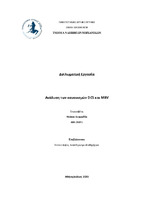| dc.contributor.advisor | Πέππα, Σοφία | |
| dc.contributor.author | Ντόκου, Ευαγγελία | |
| dc.date.accessioned | 2023-07-19T07:03:59Z | |
| dc.date.available | 2023-07-19T07:03:59Z | |
| dc.date.issued | 2023-07-17 | |
| dc.identifier.uri | https://polynoe.lib.uniwa.gr/xmlui/handle/11400/4721 | |
| dc.identifier.uri | http://dx.doi.org/10.26265/polynoe-4559 | |
| dc.description.abstract | Στην παρούσα διπλωματική εργασία μελετάται η εφαρμογή των κανονισμών για την πρόληψη και τη διαχείριση της ρύπανσης από τις εκπομπές των πλοίων στην ατμόσφαιρα και ειδικότερα τα μέτρα σχετικά με τον περιορισμό της εκπομπής των αέριων του θερμοκηπίου (Greenhouse Gases- GHG) που έχουν υιοθετηθεί από την Ευρωπαϊκή Ένωση και από τη διεθνή κοινότητα. O IMO τροποποιώντας το παράρτημα VI (Annex VI) της διεθνούς Σύμβασης MARPOL υιοθέτησε τον διεθνή κανονισμό για το Σύστημα συλλογής δεδομένων (Data Collection System, DCS), με σκοπό την υποχρεωτική παρακολούθηση και αναφορά στοιχείων, σχετικά με την κατανάλωση καυσίμων για πλοία άνω των 5000 GT από το 2019 [1].Στην εργασία αναλύεται ο Διεθνής Κανονισμός DCS παράλληλα με τον Ευρωπαϊκό Κανονισμό (EU Regulation 2015/757) σχετικά με το σύστημα Παρακολούθησης, Αναφοράς και Επαλήθευσης (Monitoring, Reporting, Verification, MRV) για τη διαχείριση του CO2 στις θαλάσσιες μεταφορές. Ειδικότερα στο πλαίσιο της εργασίας αναλύονται οι βασικές αρχές και απαιτήσεις των δύο κανονισμών και οι διαφορές τους όσον αφορά το είδος των δεδομένων και τη μεθοδολογία επαλήθευσης. Τέλος στο πλαίσιο της εργασίας παρουσιάζονται στοιχεία για τις εκπομπές CO2 των πλοίων για το διάστημα 2018-2020 με βάση την πρόσφατη ετήσια έκθεση της Ευρωπαϊκής Ένωσης. | el |
| dc.format.extent | 59 | el |
| dc.publisher | Πανεπιστήμιο Δυτικής Αττικής | el |
| dc.rights | Αναφορά Δημιουργού - Μη Εμπορική Χρήση - Παρόμοια Διανομή 4.0 Διεθνές | * |
| dc.rights | Attribution-NonCommercial-NoDerivatives 4.0 Διεθνές | * |
| dc.rights.uri | http://creativecommons.org/licenses/by-nc-nd/4.0/ | * |
| dc.subject | MRV | el |
| dc.subject | DCS | el |
| dc.subject | IMO | el |
| dc.subject | CO2 | el |
| dc.subject | SEEMP | el |
| dc.subject | MEPC | el |
| dc.subject | EEDI | el |
| dc.subject | EEXI | el |
| dc.title | Ανάλυση των Κανονισμών DCS και MRV | el |
| dc.title.alternative | Analysis of DCS and MRV regulations | el |
| dc.type | Διπλωματική εργασία | el |
| dc.contributor.committee | Ιακωβίδης, Ισίδωρος | |
| dc.contributor.committee | Λιβανός, Γεώργιος | |
| dc.contributor.faculty | Σχολή Μηχανικών | el |
| dc.contributor.department | Τμήμα Ναυπηγών Μηχανικών | el |
| dc.description.abstracttranslated | his thesis examines the implementation of European and International Regulations on the prevention and management of air pollution from ships in order to reduce Greenhouse Gases (GHG). The IMO adopted amendments to MARPOL Annex VI on data collection system for ship fuel consumption with the aim to minimize GHG emissions from ships. The mandatory Data Collection System (DCS) for international shipping has been adopted by the IMO new regulation, and starting in 2019, ships of 5,000 GT and above must begin collecting and reporting data to an IMO database [1]. In this thesis, the EU Regulation 2015/757 on Monitoring, Reporting, and Verification (MRV) for the management of CO2 emissions in maritime transport is analyzed in conjunction with the DCS on fuel usage of ships. In particular, the study analyzes the basic principles and requirements of the two systems and their differences in terms of data collecting and verification. Finally, the data on CO2 emissions from ships for the years 2018 through 2020 are presented in the last section, which is based on the most recent annual report of the European Union. | el |


